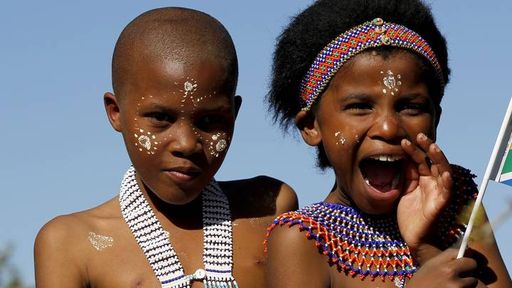In May every year, communities and organisations across Africa and within its global diaspora come together to celebrate a historic day.
From cultural performances and historical exhibitions to political reflections, Africa Day is observed annually on 25 May.
It’s a historic annual commemoration. In 1958, in Ghana, leaders from independent African countries convened for the first Congress of African States. It was a milestone gathering where the vision for a continent free from colonial rule was laid out.
Delegates proposed the creation of "African Freedom Day" to honour the ongoing liberation efforts and strengthen solidarity among countries still under colonial rule. This initiative was more than symbolic; it reflected a collective determination to reshape Africa’s destiny through unity and self-determination.
As more countries gained independence in the years that followed, momentum grew. Then, on 25 May 1963, a significant turning point was reached.
Thirty-two independent African states, met in Addis Ababa, Ethiopia, and established the Organisation of African Unity (OAU), with numerous leaders including Kwame Nkrumah, Julius Nyerere, Haile Selassie, Gamal Abdel Nasser, Abubakar Tafawa Balewa, Sékou Touré, Leopold Senghor, spearheading the groundbreaking decision.
Since then, the OAU’s formation day, May 25, has been earmarked as Africa Day.
According to the African Union, Africa Day is not only a moment to reflect on the past but a platform to build the future.
It celebrates the sacrifices made during the liberation struggles while underscoring the continent’s ongoing journey toward peace, unity, and prosperity. Central to this vision is Agenda 2063, a blueprint for achieving what the AU calls "The Africa We Want."
Lingering colonial damage
The Chairperson of the AU Commission, Mahmoud Ali Youssouf, stated, “On this Africa Day, we celebrate Pan-Africanism, our shared heritage, and the strength in our unity. We renew our resolve for justice, reparations, and a prosperous, inclusive Africa for all its people and the global African diaspora.”
The theme for Africa Day 2025 speaks to this deeper struggle: Reparations and Justice.
Advocates argue that the legacies of colonialism and slavery continue to shape modern African societies, from weakened economies to disrupted education systems. For many, reparations represent more than financial compensation—they are about recognition, healing, reclaiming dignity, and holding Western countries accountable for their crimes against Africans.
‘‘The choice of justice as this year's theme is very meaningful because it demonstrates Africa's desire to turn the page on the injustices it has faced in the past and still faces today, and to build a future of dignity and equality. It is also a call for a new and stronger Africa, based on respect and solidarity among peoples,’’ Abdoul Fathi Sanogo, Coordinator of Africa Think-Thank Platform, told TRT Afrika.
‘‘In a more balanced world order, it is imperative that Africans are treated with dignity and equality. The future of our continent will depend on new and mutually beneficial partnerships, with strong institutions and visionary leaders championing our interests,’’ he added.
‘‘I firmly believe that an Africa united by political determination will first ensure the prosperity of its own people and then make valuable contributions to global governance,’’ he suggested.
Politically, the dream of self-rule has largely been achieved, but economic independence remains elusive.

The Africa Day celebrations are marked not only across the continent. The African diaspora also celebrates the day in their host countries.
In Türkiye, a non-governmental organisation, the Association of All Friends of Africa (TADD), and Istanbul University, organised events in Istanbul, focusing on ties between Türkiye and African countries, bringing together panellists to discuss relations and Africa's development.
"We speak about the history of Africa, neo-colonisation, and everything. Today, I decided to take a paradigm shift and spoke about technology, digitisation, and digitalisation as catalysts for the development of the African continent," Mustapha Aminu Tukur, a Phd candidate at Yildiz Technical University, told TRT Afrika.
This comes as Türkiye boosts ties with African countries in various fields, including economy, security, education, and diplomatic relations.
"Being here is something that's absolutely great because we're actually catching the opportunity and discussing issues related to Africans in Türkiye and beyond, celebrating our success and culture in an almost African environment," Faroukou Mintoiba, the head of Bizim Afrika, an Africa diaspora organisation in Türkiye told TRT Afrika.
Growing ties with Türkiye, calls for louder voice
Many African nations continue to face structural challenges such as debt, trade imbalances, and limited industrialisation. In response, a growing number of countries are seeking new partnerships beyond traditional Western alliances, turning to emerging players like Türkiye and Russia. For instance, Türkiye's engagement with Africa has expanded steadily since it declared 2005 the "Year of Africa."
The country has significantly increased its diplomatic presence, opening dozens of embassies across the continent, and in 2008, it was granted observer status at the African Union.
One key area for Türkiye is boosting its ties with African countries through education, with thousands of Africans studying in Türkiye through scholarships.
Students are "very valuable" in building a "new, strong Africa" and boosting ties between Türkiye and African countries, Bilgehan Güntekin, president of the Association of All Friends of Africa, told TRT Afrika.
While seeking alternative partners amid changing global political, security, and economic landscapes, African countries have been calling for greater representation on the global stage.
There are growing calls for permanent seats on the United Nations Security Council for African countries and a stronger voice in international financial institutions, aimed at ensuring the continent has a say in decisions that affect its future.
As Africa Day is commemorated, it remains a moment to reflect on past struggles, assess current challenges, and reaffirm the continent's commitment to shaping its own future.
Analysts hope the celebrations marked by glowing speeches and cultural performances will translate into real dividends for Africans in terms of greater economic prosperity, peace, and total sovereignty.















